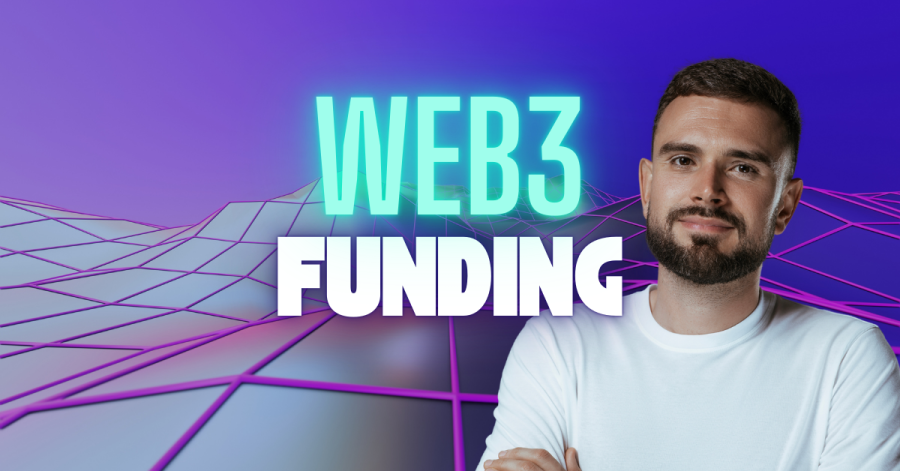An average VC receives around 1,000 funding applications a year. Only 30-40 startups make it to a meeting, and even fewer secure funding. The current bear market has made fundraising even more challenging, and many founders feel discouraged. Also, the Web3 space is not the most manageable environment — innovation often outpaces regulation here.
However, things have somewhat stabilized since the recent US election: VCs actively seek promising projects. Just as much as the founders are interested in financing, the VCs don’t want to miss out on the next big thing.
When investors spot a strong idea with growth potential, they won’t hesitate to back it. At Rewump, we do just that; other investors share this perspective, which they shared in this article as well.
From my experience working with early-stage startups, the right approach can make all the difference in securing funding. Here’s what you can focus on in 2025 to increase your chances of success.
Focus on structuring business
Web3 funding in 2025 differs from how it used to be. In the last crypto cycle, it was relatively easy to secure investments, even with just a PowerPoint presentation. Many projects raised significant funds without having a clear plan or product. But things have changed.
Today, VCs are much more cautious and professional. They’ve learned from past mistakes, where many invested in projects that were either incomplete or outright scams. As a result, they’re looking for more solid foundations. It’s no longer enough to pitch an idea or launch a token without purpose — startups need to show real progress, such as a finalized MVP (Minimum Viable Product), user traction, and other measurable results.
The ecosystem itself has become stricter, which is a good thing. Scam projects and “rug pulls” hurt the industry’s reputation, and this shift toward professionalism helps build trust. Web3 startups now need to think like Web2 businesses: define their business model, finalize their MVP, and plan a clear go-to-market strategy.
“If you’re a Web3 founder, focus on structure before pitching to VCs. Start with smaller investors, like business angels, or use ecosystem grants to build momentum. By proving your project’s value with numbers and a loyal user base, you’ll stand out in this more disciplined and competitive environment,” says Pedro Miranda, Head of Partnerships at Yellow Capital.
Demonstrate a Web3 experience
At Rewump, we have a whole checklist of requirements we look at before considering funding a startup. We usually categorize founders into two groups: experienced entrepreneurs and passionate startup enthusiasts with strong potential.
But regardless of the category a founder falls into, one of the most important things we focus on is their experience in Web3 and past success.
They need to demonstrate a solid understanding of Web3 technologies, a clear vision, and the drive to innovate. We’re looking for teams that not only have hands-on experience but also know how to build and scale Web3 projects. Previous involvement in the Web3 space — whether it’s building dApps, working with DeFi, NFTs, or contributing to other Web3 ventures — really stands out to us.
If you’re a newer founder and don’t have much Web3 experience yet, it doesn’t mean you’re out of the running for funding.
Pedro Miranda suggests bringing a Web3 advisor on board. Talk through your ideas with them, get their advice on the technical and strategic sides of your project, and use their network to make valuable connections.
“You can find Web3 advisors through platforms like LinkedIn, where many industry leaders and professionals share their expertise. Attend local meetups or use tools to discover events in your area. Major conferences are also excellent places to meet experienced advisors. Explore online Web3 communities and ecosystem-specific programs, where advisors often offer mentorship opportunities,“ recommends Pedro.
Make sure you and your team work well together
Investors don’t just focus on your numbers, MVP, or market fit—they closely evaluate how you function as a team. They want to see how adaptable you are to a changing environment and how effectively you collaborate. While the product may evolve due to investor feedback, the strength and cohesion of the team should remain constant.
Nir Netzer, VC Investor at Tenity, shares: “In early-stage investment processes, evaluators often look at team dynamics over time. Through structured evaluation periods, selection milestones, and regular interactions, they observe how teams handle specific projects and challenges. This allows investors to assess whether the team is equipped for long-term success.”
Tom Phipps, Head of Web3 Strategy at Flight3, says they also look at the founder’s personality.
“Sadly, sunk cost fallacy, ego, and sheer stubbornness can be a founder’s worst enemy and derail what could have been a promising startup. If there are any signs of this in early communication with founders, this negative signal will quickly deter investors. Such qualities increase the founder’s risk profile and can lead to the deal just not being worth it for that reason,“ says Tom.
Show you care about transparency
“One red flag for me is that the team is not public,“ says Pedro Miranda. True, if the team is visible, and you as a founder are active, there is much more trust for you in the space.
Founders with strong personal brands show not only credibility and leadership but also the understanding of how vital their presence actually is. This personal influence helps inspire teams, partners, and investors. While it’s tempting for founders to let their company’s brand do all the talking, it’s often their own voice, vision, and personal story that truly resonate.
“In Web3, this is particularly important given that it is such a nascent industry. Early-stage companies have little reputation at inception and, so founders using their personal brand can be incredibly helpful. This is even more true when social listening tools, such as Kaito AI, assess which profiles capture the most mindshare on X, the public forum of the majority of crypto conversations. Founders need to be taking advantage of these opportunities,“ says Tom.
However, this transparency and visibility shouldn’t just concern the team but also the product or service. Whether you’re in banking, insurance, or any other sector, make sure you know the person you’re serving is indeed who they claim to be. Fraud is a persistent issue, and while it’s a concern among many industries, it’s particularly pressing in Web3. Developing an infrastructure where security is inherent will demonstrate that you’re committed to security in the long run.
Pay closer attention to user feedback
One of the biggest mistakes investors often see in Web3 startups is not tuning their products or services enough to user feedback. Many founders get caught up in building for the sake of building, and when they finally bring their product to market, they’re surprised to find that no one wants to use it.
As Tom puts it, “By starting from a place whereby founders are building with iterative feedback loops in place, meaning they can deeply understand their audience and market, it makes the GTM a lot easier with data-led decision-making, rather than a finger in the air style of approach. They can craft far more compelling narratives and appear far more credible — helping create a stronger overall pitch.“
Next steps…
Overall, the Web3 industry is becoming more regulated, and VCs are getting better at recognizing products with great potential. In recent years, this trend has only strengthened. If you want to earn the trust of investors, focus on building a strong structure, tracking your numbers, developing a good relationship within your team, and making sure your audience is responding to your product.
While the timing may not be the most efortless right now, technologies like DeFi, AI, and RWA are in a strong position to attract investment. Networking and seeking new opportunities — whether through VCs, angel investors, or accelerators — should be your main job as an early-stage founder.








